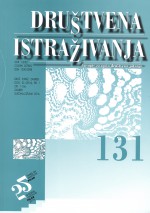
Around the bloc: Hungarian Cops Red-Faced Over ‘Terror’ Raid Gone Wrong
Suspicious weapons, explosives turned out to be World War II memorabilia.
More...We kindly inform you that, as long as the subject affiliation of our 300.000+ articles is in progress, you might get unsufficient or no results on your third level or second level search. In this case, please broaden your search criteria.

Suspicious weapons, explosives turned out to be World War II memorabilia.
More...
Elected and appointed officials could be barred from public service for 10 years or more.
More...
New government says additional troops will be stationed along its eastern borders.
More...
The president, himself a son of war refugees, accuses Europe of losing its global standing and passionately defends Angela Merkel’s leadership.
More...
Amnesty hails government move as a victory for human rights, urges other countries to follow suit.
More...
The Balkan country bows to demands from Brussels and Washington for a more transparent legal system.
More...
At least 45 injured as protestors attack riot police.
More...
The first reported court trials for war crimes concerned offenses committed during theAmerican Civil War (1861–1865). After World War I, the victorious nations of the Ententeattempted to put the former German Emperor Wilhelm II and other German military leadersresponsible for particularly drastic crimes. The former ruler took refuge in the Netherlands,which refused to extradite him, and the Reich Tribunal in Leipzig held a numberof trials under heavy pressure from the victorious coalition. The majority of them led toacquittals or exceptionally short sentences, which resulted in the Leipzig process being labelleda travesty of justice; during World War II the allies regarded it as a negative experiencewhich they should avoid repeating at all costs. During the period 1919–1920 severaldozen trials concerning the slaughter of Armenians were held in Turkey by Turkish andBritish authorities, but they were equally inadequate for the scale of the crimes committedinvolving the murder of almost a million people. The anti-Hitler coalition thus couldnot draw on any real examples from the past when seeking to account for the crimes of theThird Reich and its allies, nor were there any international legal regulations or institutionalsolutions that they could look to. The first action taken to document the crimes committedin occupied countries were undertaken by governments-in-exile in London, primarilythat of the Republic of Poland. It was pressure from that as well as other governments aswell as others which led to the formation of the War Crimes Commission in October 1943,which developed a new legal concept and category: crimes against humanity. It turnedout to be key in enforcing liability for crimes against civilians; it was invoked during theNuremberg trials, and is also applied in many contemporary criminal proceedings. Thefirst joint Allied commitment to prosecuting war crimes was the Moscow Declaration of1 November 1943, but even after its adoption there were serious disagreements among theallies as to how this should be done. Winston Churchill, the Prime Minister of the UnitedKingdom, was opposed to the creation of an international tribunal, citing the differentlegal systems of the Allies and the fiasco of the Leipzig trials following World War I; hewas a supporter of summarily executing the leaders of the Third Reich and fascist Italy.The legal framework of the post-war trials was only developed during the closing monthsof the war, with American politicians and lawyers playing a key role. Their contributionwas to base the most important post-war trials on three pillars: the categories of crimesagainst humanity, crimes against peace and the charge of conspiracy to commit crimes(a direct transplant from the American legal system). The trials held before the InternationalMilitary Tribunal, held in Nuremberg from 20 November to 1 October 1946, werean attempt, unprecedented in the history of civilization, by the international communityto bring to justice the leaders of a defeated state to justice for their crimes. In spite of thenumerous criticism levelled against various aspects of the Nuremberg trials, it ultimatelybecame a point of reference and an example for later attempts at placing political andmilitary leaders on trial for their crimes.
More...
Countries in Central Europe and the Balkans have discreetly been sending weapons that likely end up in war zones in the Middle East, investigation reveals.
More...
Arrest may lead to more scrutiny of Tehran’s alleged financial support for Balkan Muslim groups.
More...
Western security firm refuses to confirm it sold Uzbekistan spyware able to monitor phone calls and e-mails.
More...
Law and Justice set to return to power in a Poland divided on social issues such as gay rights.
More...
Residents of rebel-held areas and many internally displaced people can’t vote in the third round of nationwide elections since the Maidan uprising.
More...
British broadcast on arms trafficking in Romania scrutinized for alleged unethical journalistic conduct.
More...
Ledgers found in Kyiv list undisclosed cash payments to the chairman of Trump’s presidential campaign.
More...
Montenegro pledges to halt the trade if evidence emerges of Saudi-bound weapons being diverted to Syrian militias.
More...
Over the previous 15-20 years (in Czech conditions), suburban processes have substantially influenced the appearance and transformation of municipalities on the fringe of larger cities. And it is not only the morphology of the municipality structure (new housing estates and their urban as well as architectural solutions) that has undergone the transformation, but also the functions municipalities have started to fulfil (the development of civic amenities and services). After such a long period of time, we are capable of identifying negative as well as positive impacts of suburban processes on municipalities, and evaluating the role of local actors (with regard to local governance) in the shaping of suburbias and their appearance (the area urban solution, infrastructure, architecture in terms of housing appearance, etc.). We are also capable of assessing new construction sites based on their location or appearance (housing naturally complementing or suitably extending the municipality built-up area, or, on the contrary, a satellite housing estate built "on a greenfield site"), social climate between old residents and newcomers, etc. The goal of the paper is to present the most significant aspects that have had influence on new housing construction in suburban zone municipalities, and to describe differences in the application of the concept of local governance (at the lowest - microregional, or possibly municipal tier) in positively impacted municipalities as compared with those affected rather negatively. Concentrating on the city of Olomouc and its suburban zone in greater detail, the study shall also outline expected future development.
More...
Residential suburbanisation is currently the most important urbanisation process transforming metropolitan areas in European post-socialist countries, especially in Central Europe and at Baltic states. The paper compares the statements of the mayors of the suburban municipalities situated in the hinterland of the city of České Budějovice (a one-hundred-thousand city in the South-West of the Czech Republic) and also the local building officials, spatial planning officials and experts regarding the recent, currently on-going and upcoming construction of houses in the suburbs and the regulation of these constructions. Further, it discusses the possibilities of influencing the construction of the houses through the spatial plans of municipalities, settlement zones, and metropolitan areas. The interviewed mayors consider, rather uncritically, the recent large construction of houses in their suburbs in general as appropriate. One third of the mayors, however, do not want any further suburban development of this kind. Spatial planning officials and building officials do not have sufficiently powerful tools to influence the extent of the construction and the designs of houses in the individual suburban municipalities and their suburbs. Some of them, together with the experts, support the reintroduction of the metropolitan area spatial plan.
More...
The court upheld the conviction of a blogger for a social media post describing Soviet-Nazi collaboration during World War II.
More...
The paper analyses and considers the character and consequences of reforms in the eldercare system in Croatia, putting reforms in comparative perspective and taking into account the existing knowledge on the effects of similar reforms in European countries. The analysis begins with the period of socialism when the eldercare policy started to develop and continues through the 1990s marked by pluralization of service providers and the beginnings of decentralization, and the period of the 2000s until today marked by growing fragmentation of the system and the professionalization of non-institutional forms of care. The social risk of dependence in older age does not have the necessary attention of policymakers. Reforms of the past twenty years aimed at cost-containment in the eldercare system and the reduced role of the state, and were reflected in marketization, individualisation and professionalization of care. The eldercare system failed to cope with the growing demand for services and remains of residual character, fragmented and characterized by social assistance orientation. Future reforms will have to seriously address the sustainability of the eldercare system, in particular sustainable solutions of financing long-term care.
More...